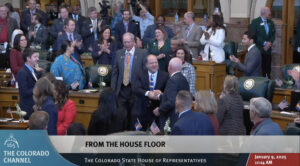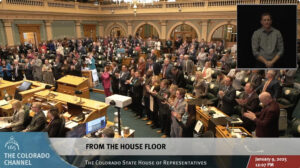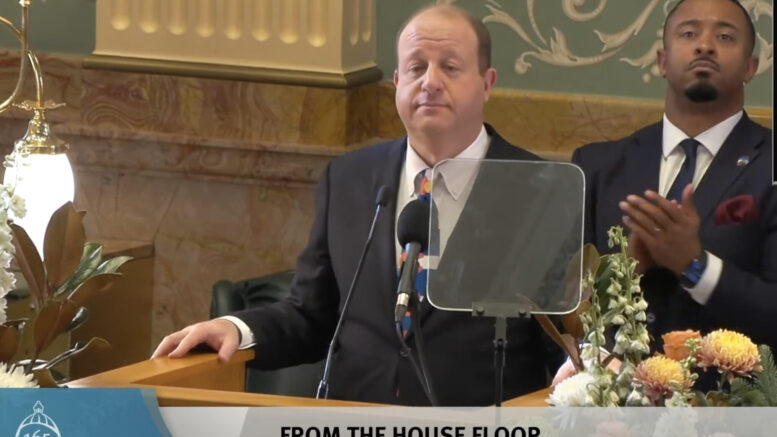Gov. Jared Polis used his State of the State Address on Thursday to call out several major business priorities, including asking legislators to undertake regulatory reform and saying he only wants to alter the Labor Peace Act if employers and workers agree on changes.
The Democratic governor also pushed legislators to advance construction-defects reform, appeared to side with hospitals in their fight with pharmaceutical manufacturers over the federal 340B drug-pricing program and called for more laws to boost housing construction. And after reaching a deal with environmental groups and oil-and-gas companies in 2024 around new fees and regulations, he notably did not call for any new pollution-reduction measures this year, focusing instead on housing and transit to meet climate goals.
Polis’ seventh and penultimate State of the State — he is term-limited from seeking re-election in 2026 — may have been the annual speech of his that was most well-received by business interests. His push for regulatory reform and caution against changes to the Labor Peace Act, both made in the name of operational stability, seemed an attempt to offer guidance to legislators from his party who have sought more restrictions on businesses than Polis has liked.
A plea for regulatory reform
In discussing regulatory reform, the governor noted the work of the Colorado Chamber of Commerce, which recently commissioned a study showing the state ranks sixth in the U.S. for total regulations, 45% of which are considered redundant or excessive. He urged legislators to “take a good look at Colorado’s laws and regulations and honestly question whether they are adequately balancing consumer protection, health and safety while minimizing red tape and reducing costs for the private sector and for all Coloradans.
“As you make your review, I encourage thinking about what more could be done to unleash small businesses and drive economic growth,” said Polis, whose entrepreneurial success in the late 1990s helped to launch his political career. “We all have a role to play to foster a healthy business environment that works for everyone. This includes protecting business certainty and keeping our economy competitive while also ensuring good wages and opportunities for all Coloradans.”
Colorado Chamber President/CEO Loren Furman said she was grateful for Polis calling out her organization’s work and prioritizing reform, adding that she hopes to work with both sides of the aisle to create and pass “an ambitious regulatory relief package.” Senate Minority Leader Paul Lundeen, R-Monument, and Senate President James Coleman, D-Denver, also stated their desire for reform in their opening-day speeches on Wednesday.

Gov. Jared Polis shakes the hand of state Rep. Anthony Hartsook as a committee of legislators leads him into the Colorado House chamber to deliver his annual State of the State Address on Thursday.
Call to stop “rancorous fights” on unionizing bill
While he urged changes to state regulations, Polis also urged caution regarding a plan from majority Democrats to rewrite the Labor Peace Act and eliminate a second election that’s required to let unions deduct fees from workers’ paychecks at organized companies. He noted that the law, signed in 1943 and unique in America, has halted efforts to make Colorado a right-to-work state — something he would oppose — and said it shouldn’t be changed without consensus among affected parties.
“My ask is that if there are any efforts to reform the Labor Peace Act, they include support of both workers and businesses to avoid the rancorous fights of the past,” the governor said as a business coalition pushes back strongly against nixing the second election. “If there is a possible agreement to change the status quo that has served to avoid significant disputes for more than eighty years, let’s work together to find it.”
Business leaders also are likely to be heartened at Polis’ continuing push for construction of more affordable housing at a time when the cost of living in Colorado has made it more difficult for employers to recruit talent. After inking a package of laws in 2024, new changes should include streamlining the process for constructing modular housing, allowing residences with fewer stair requirements and letting faith-based groups and schools build housing on their properties, he said.
Construction-defects reform on the table again
Significantly, the governor again called for construction-defects reform to unlock a nascent condominium market that’s responsible for less than 5% of new housing stock statewide and that offered just 22 properties under the cost of $400,000 on the market last year. Polis expressed concern that the conversation “has been stifled on both sides” and asked for both tort-reform advocates who are seeking to limit lawsuits in order to generate more lower-cost owner-occupied housing and the plaintiff’s attorneys who have fought legal changes to work toward compromise.
“Let’s turn the page and have a real dialogue about what is preventing condos from being built — and solve for it,” Polis implored, citing a bill on the subject that is expected to be introduced soon by Rep. Shannon Bird, D-Westminster. “I know we can get this done in a way that protects homeowners’ rights when there is a defect but makes it less expensive and cumbersome for builders of all kinds to start projects and deliver housing.”

Gov. Jared Polis receives a standing ovation at the end of his State of the State Address on Thursday. A man offers sign-language interpretation for online viewers at the upper right corner of the screen.
In response, condo-owner group Build Our Homes Right said in a news release that it is pleased to dig into the root causes for the shortage of new condos just as long as residents maintain their right to use all means to protect the largest investment most will ever make.
Health-care requests
On health care, Polis seemed to wade into a battle between hospitals and pharmaceutical manufacturers over whether drug makers should be allowed to limit the number of pharmacies health systems can use to get pricing discounts via the federal 340B program. While pharma leaders have said guardrails are necessary to prevent abuse of a $66 billion federal discount program that grew 50% from 2021 to 2023, Polis called for passage of a bill “to protect and expand prescription-drug discounts to better serve our most vulnerable.”
However, he also chastised hospitals that charge commercially insured patients nearly three times the Medicare reimbursement rate while safety-net hospitals and clinics “are being left behind.” And he called for passage of another coming bill whose details remain vague but that would “deal with excess hospital prices while also protecting our safety net.”
Meanwhile, his speech also was notable for what it didn’t include — a call for more environmental protections against air or water pollution, which have peppered many of Polis’ other annual addresses. Last spring, Polis reached a deal with dueling sides on the issue in which legislators and activists agreed to boost some regulations and create a new extraction fee in exchange for not seeking other substantial oil-and-gas rules in law or at the ballot before 2027.
A different approach to environmental bills
Still, some environmental organizations not privy to that deal have been shopping bills to do things such as ban new drilling after 2029 or ban oil and gas advertising, and the governor seemed in his address to say he was not interested in that. Instead, Polis spoke of boosting transit and rail service further and using housing policy to reduce vehicle trips and emissions, and one statement in particular seemed to capture this new approach.
“Our housing and transit goals go hand in hand with our climate goals and our affordability goals. More, better, less expensive transit options, with housing closer to job centers and transit hubs, save money and mean less pollution and less congestion,” he said. “As they say in ‘The Mandalorian’: ‘This is the way’ — the way to build a clean-energy future, to tap into low-cost clean energy, protect Coloradans from volatile price swings of natural gas, save people money and create jobs.”
The session continues Friday with a State of the Judiciary report from the Colorado Supreme Court before more formal bill considerations begin as early as next week.
